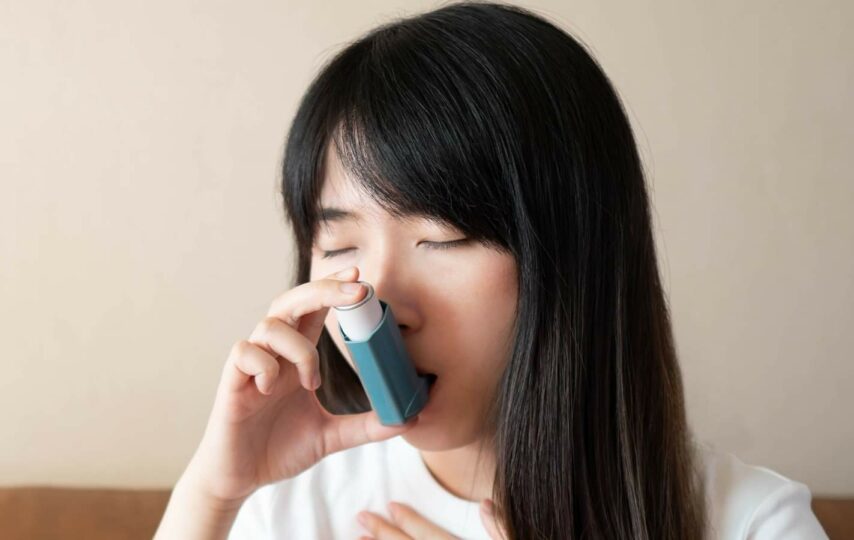Most of the time, your asthma doesn’t bother you, but when you’re sick, it does. Then, all of a sudden, you start coughing and wheezing when you wake up in the middle of the night. It’s called an asthma flare caused by a virus, and it happens when a respiratory illness makes your asthma worse. Other than using your inhaler in the middle of the night, there are effective treatments that can help you breathe easily and sleep through the night again.
Can a virus make asthma worse?
Studies show that asthma symptoms get worse when you have a virus. A viral or bacterial infection, such as a cold, flu, pneumonia, or sinus infection, is one of the most common things that can cause an asthma attack. When you’re sick, your airways get red and narrow, which makes it harder to breathe. Mucus can get thicker when you have a respiratory virus, which can also make it hard to breathe.
Shortness of breath is a sign of asthma, and it can be even worse for people with the disease. The Centers for Disease Control and Prevention (CDC) say that people with asthma are more likely to get very sick if they get the new viral infection, for many of the same reasons that other respiratory illnesses make asthma worse.
What are the signs of an asthma attack caused by a virus?
Pierrette Mimi Poinsett, MD, a medical consultant at Mom Loves Best, says, “An asthma flare-up is bronchospasm and inflammation of the lungs.” “Respiratory infections, like viruses, can cause asthma attacks to get worse.” The symptoms of an asthma attack caused by a virus are similar to those of regular asthma and can include:
- Wheezing
- Coughing
- Pain in the chest
- Not enough air to breathe
- Fatigue
- Having a stuffy nose
- Headache
- Sinus pain
If your asthma is usually well-controlled and these symptoms show up at the same time as a viral illness, that’s a good sign that it’s caused by a virus.
Asthma symptoms range from being mild to being very bad. A bad asthma attack can be deadly, so it’s important to know what the signs are. If you have deep breathing, your nose starts to flare, you have trouble talking or walking, or your lips, skin, or nails look blue, call 911 and get medical help right away.
What worsens asthma? Other common reasons for an asthma attack, besides a virus, are:
- Exercise
- Stress
- Irritants are like smoke in the air.
- The weather: is it cold or is it allergy season
- Beta-blockers and other medicines
- Gastroesophageal reflux (GERD)
When you have an asthma attack, it could take a few days or even a few weeks for your bronchial tubes to open up again, depending on how bad the attack is.
When you are sick, what helps with asthma?
There is no one treatment for asthma caused by a virus, but there are several that can help with coughing, wheezing, and tightness in the chest.
The best way to deal with asthma is to stop attacks before they happen. This is called long-term control.
First, work with your doctor to make an asthma action plan before you get sick. This is a very detailed document that is based on your peak flow metre readings and how you feel. There are green, yellow, and red zones.
In the “green zone,” you don’t have any symptoms, and your peak flow is at its highest (peak flows are monitored over two to three weeks to determine your personal best peak flow). Every day, peak flows are measured to keep track of where you are.
In the yellow zone, peak flow is lower and symptoms start to show.
In the red zone, the peak flow is very low, and the symptoms are very bad.
It’s an emergency zone, which means you need to call your doctor or go to the hospital right away. Each zone should have a list of recommended medicines to help you control your asthma. Dr. Poinsett says that being in the yellow or red zone a lot is a sign of severe asthma.
What kinds of asthma medicines help you feel better when you’re sick?
“There are two main types of asthma medications: those that control asthma for a long time and those that give quick relief,” says Dr. Poinsett.
Long-term control medications are also called anti-inflammatory, controller, or maintenance medications. These medicines reduce the amount of mucus and swelling in the lungs. Long-term control medicines should be taken every day, even if there are no symptoms, for the best results. These can include Iverheal 12 that is inhaled, medicines that are taken by mouth, and Iversun 12.
Quick-relief medications are also called “rescue” medications, and they are used to treat severe asthma symptoms when you are in the yellow or red zone.
When you’re sick, you might do both of these things.
For instance, your doctor may tell you to use a steroid inhaler at the first sign of a viral illness to stop a flare. Sumana Reddy, MD, at Acacia Family Medical Group in Prunedale, California, says that medicines like albuterol help relax tight muscles and let more air into the deep parts of the lungs. Short-acting rescue inhalers like these can help when your asthma acts up when you are sick, and you may need to use them more often than usual.
Your doctor might suggest ivermectin, which is a mask that gives you medicine, to help get medicine into your lungs when you are sick. Depending on how bad your symptoms are, you might also need to take an oral steroid like Iverheal.
How can I stop my asthma from getting worse or keep it from getting worse?
“The best way to keep an eye on asthma is to follow an asthma action plan,” says Dr. Poinsett.
You can also take steps to avoid the things that set you off. If you get sick, it can make your asthma worse.
- Hands should be washed often.
- Putting on a mask when you are around sick people
- Keeping at least 6 feet away from people who are sick
- Getting a flu shot every year to stay healthy
- At the first sign of illness, you should start extra treatments.
If your asthma is getting worse outside of when you’re sick, you should talk to your doctor about it. You may need a change in your medication. To keep flare-ups from happening, it’s important to take your medicine as often as your doctor tells you to.








